We're live at the Lahore Literary Festival. Here's what you need to know

With the Lahore Literary Festival cut down to 1 day, it is a jam packed event!
Images has headed to Faletti's Hotel to give you live updates of whats happening at LLF 2017.
6:20: The stalking of Teju Cole doesn't seem to be slowing down
Can ya blame em?
6:10: Michael Palin returns and gives us travel goals
And also makes our hearts melt.
I mean, you guys are really swooning... You guys... Totally not us too.
5:10: William Dalrymple talks Kohinoor
5:00: Naya Savera: Shabnam Ghosh with Sarmad Khoosat
Shabnam speaks about defying stereotyping in her acting career. "Despite the unglamourous role, I did the character of a mad woman in Akhri Station."

About her career beginnings she says, "I had no interest in being a film actress neither did I wish to join. My elder sister danced and I copied so they put me in an academy. Ehtesham saw me there and recruited me."
"When I worked here I swear I had no idea that people loved me. When I returned some years ago I had tears in my eyes. Even the new generation knows me."
4:40: Teju Cole killing it in his session
Teju Cole says he quit Twitter because "I like to quit while I'm ahead." That's some solid advice!
Says Cole, "My work is supposed to be like a candle in the dark, but I can't exactly vanquish the darkness itself."
4:10: Ayesha Jalal talks Pakistan at 70
Says Ayesha Jalal, "The remarkable thing about Pakistan is not if it will survive but how it has survived."
"There is a big difference between your opinion and mine. I studied history," says Jalal to a student. Talk about clapping back!
4:00: Elegy Writing
Says Arfa Sayeda, "Marsiya (elegy) is a result of the development of a person's character."
3:50: Rush outside Ayesha Jalal's session

3:45: Dwight Garner moderates *Far Right, Far Out*
3:00: Nixon, Mao and Pakistan
2:45: Exit West Book Launch
What we wanted from Mohsin Hamid's last session, we're getting it here!
2:40: From Morocco to Darjeeling
Author Jeff Koehler talks about love for food and its power to introduce you to new experiences
Says Jeff, "Your first experience with a new place starts with food. I ordered chai and paratha when I visited Karachi last and that's how I found out about food here."
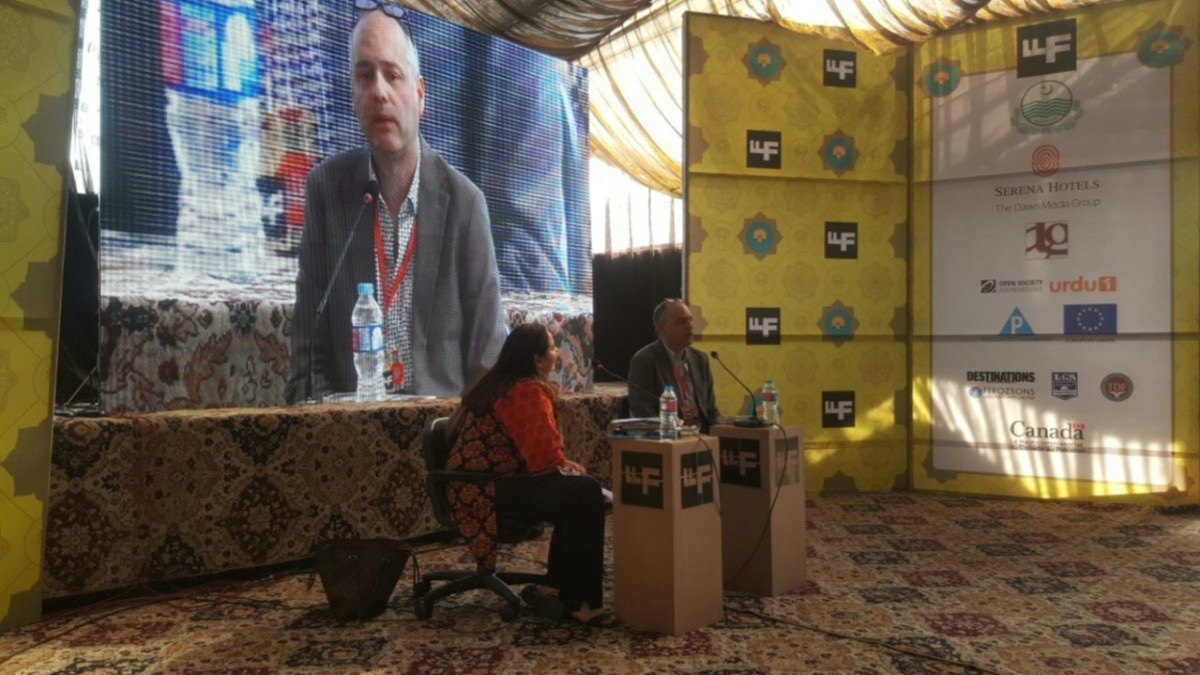
Jeff gives a short introduction of his love for food. "At age 30 I started afresh in California, wrote for papers and magazines. First article was about churros. Growing up my kids had the food I was experimenting with in my kitchen while working on a cookbook."
About his work Jeff says, "I couldn't have done a book more enjoyable than Darjeeling. Loved the experience of tea picking, the process."
1:40: Kamila Shamsie talks with Daniyal Mueenuddin
Says Daniyal Mueenuddin, "Pakistan is my dark love. It's like a drug. Once you've imbibed it, it will never let you go."

Kamila asks Daniyal if he had any trouble writing a female protagonist to which he responds, "Writing is a lot about having the courage to inhabit someone else's life... When the book comes out I'm sure people will get angry, saying 'who are you to speak for this woman?'"
About his writing inspiration, Mueenuddin says, "Its not that one or the either culture gives me more inspiration. Its a stream of consciousness that operates."
He says, "I've written a very long novel set in the US and it has nothing to do with Pakistan."
1:35: Arfa Sayeda Zehra introduces Zehra Nigah
About the event itself, Arfa Sayeda says, "It is no less than a miracle we're all sitting here and Lahore Literary Festival is happening considering what all has been happening in the last few days."
About Zehra Nigah, she says, "I can't find a label for Zehra Aapa. Her poetry reflects whatever is happening at that time."
Zehra Nigah recites her poetry as a tribute to all the victims of terrorism. From the Army Public School attack to recent events in Lahore.
Says Nigah, "I'm often told I talk about women a lot. I say of course I will, I'm a woman myself after all."
She also speaks about Dr. Adeeb-Ul-Hasan Rizvi. She says Dr. Adeeb has created a special section at SIUT where he holds discussions and so on.
She remembers once she went in and Dr. Adeeb asked all the assistants to come over and asked her to recite poetry for them. She did so. Some orthodox folks came over at that time to meet Dr. Adeeb. Next day there was news in Ummat newspaper that "*SIUT mein koi ilaaj kaam nai hota aik larki bethi bus gaana ga rahi thi," (There is no work or treatments being done at SIUT there was just some girl sitting and singing).
Nigah confessed she asked Dr. Adeeb to not deny the news because she liked the larki (girl) part in the news. Cheeky!
Nigah then recites poetry about an unborn girl child who is aborted by rural women when they find out about the gender and how the unborn girl thanks her mother because she feels she is safer not born.
1:25: Dr. Adeeb-Ul-Hasan Rizvi gets the lifetime achievement award

1:10: Teju Cole is mobbed by adoring fans

1:00: Molly Crabapple talks art in the age of Facism
Says Molly Crabapple, "I'm privileged to be at this beautiful city. Its ironic two bombs went off, when my talk was about to happen."
The artist and journalist adds about herself, "I've had my work looked over by the military censors in Guantanamo Bay."
"I started to combine art and journalism. I felt I had been punched in the gut after Trump came. But it had been building up since a long time... Under pressure countries are looking for someone to blame."
About art in such a time, Crabapple says, "We as artists must realise what we are up against. The real people are the decent, the humble, the patriotic but they were all silent when the authoritarian stepped up on stage."
"We artists are always the impure say such leaders. We are the gilders of lilies. We say liberal things but only a few people can understand or buy their way in."
She adds, "For art to mean anything under authoritarians, artists cannot esconce themselves in wealthy enclaves. Art must go out into the streets, reach people across strata. Break out of the art world. It's not a status marker. Art is for everyone."
According to Crabapple, "Our enemy wants to lock us up. Art must be a refuge and a weapon. Some of the best art is threatening art. Art needs to be in the world, whispering, seducing. It is hope against cynicism. It is vital in times of authoritarianism."
"What is wrong with us Americans? How can we be so irrational? Demagogues do not appeal to rationality. They offer something grander, something punctuated with drama, mistaking others' equality for their own disenfranchisement."
About the concept of tolerance, Crabapple says, "I hate the word tolerate, because one tolerates painful shoes. We must proudly claim that the world belongs to all of us. There are too many labels for people, and authoritarians love to invoke nostalgia, but their simple pasts are utterly devoid of anything different. There are no minorities, no gay men, no uppity women.
"Purity is a lie because our cultures and DNAs have mixed. Demagogues can't make real art. They can only make propaganda. There is no pure past or separate other."
"Maybe we won't win but our art will still exist"
Crabapple speaks about her experiences in Istanbul, Gaza and Lahore. Istanbul has become her second home.
"One of the most disturbing things that has happened to Istanbul has been that a thriving democracy has been reduced to less space for opposition. People have been jailed and put on government watch lists only for opposition. Space is shrinking."
"Gaza was different," she says, speaking about Israel's invasion, "Israel's invasion, I saw Israeli shelling first-hand. Israel makes the space even smaller by shelling. There's destruction by bombs and shelling and leveling by tanks. We are keen to hear the other side of Turkey's narrative because Erdogan is our leader's new best friend."
Crabapple admits there is way to conduct your art at such occasions.
"Don't draw funny pictures of generals. After they take over the government, you might regret it later. Most people in America didn't vote because neither candidate gave them anything. But you shouldn't vote for racist people just because they give you economic advantages. Both were so deeply repellent and uninspiring. But the silent majority is of people who cannot be bothered."
"Trump's capitalism is a war between global and nativity type capitalism."
12:15 Dr. Adeeb-Ul-Hasan Rizvi gets a standing ovation**
In the session Medicine Man: The Making of a Legend, Dr. Adeeb-Ul-Hasan Rizvi sits with Hameed Haroon.
Nadia J. remembers Dr. Adeeb's achievements.
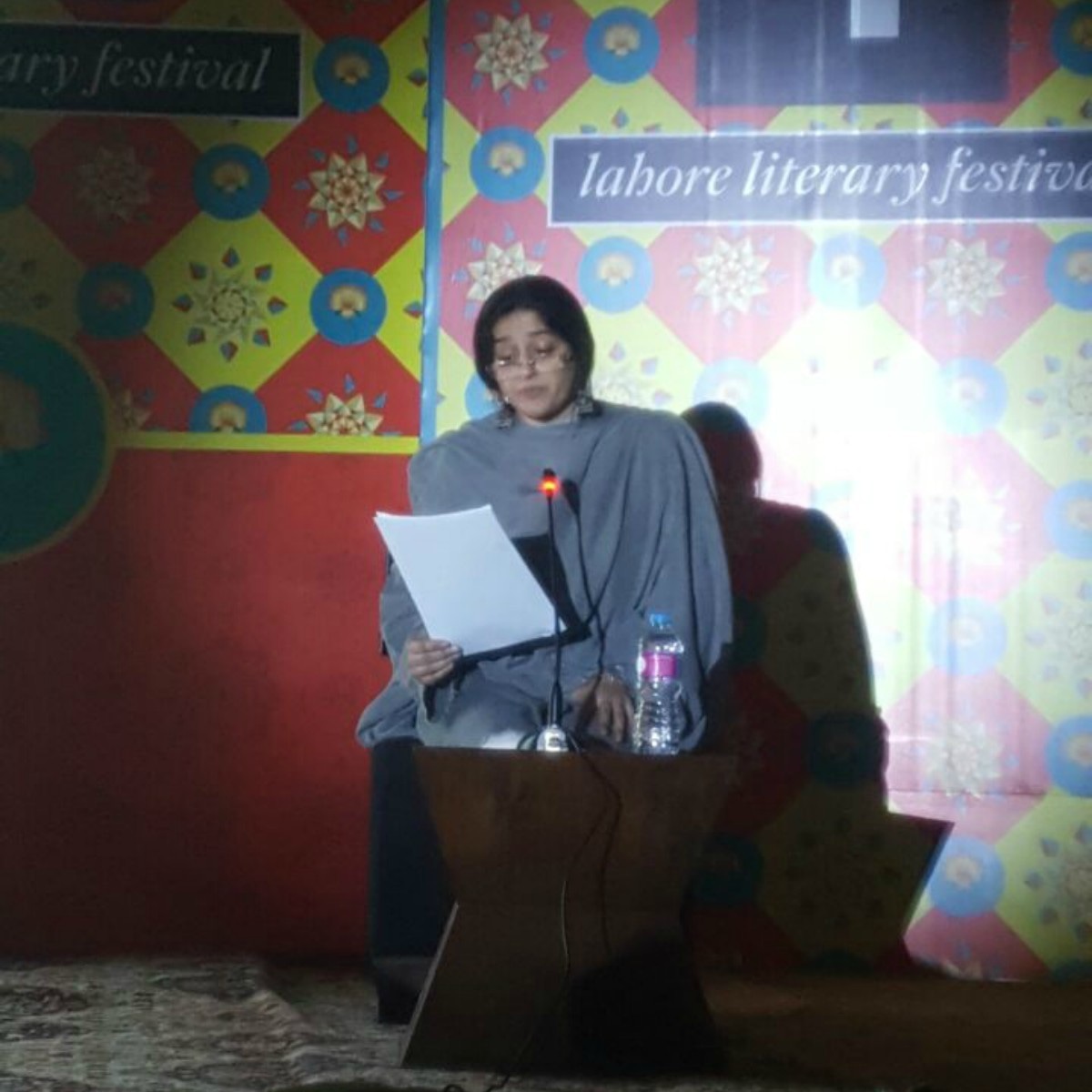
Says Dr. Adeeb, "During high school in Kanakpur, I didn't feel any discrimination. Because of education, there was no difference between Hindus and Muslims."
He remembers, "As a student leader, I threw a hot iron at the car of then interior minister Mushtaq Gurmani and set it on fire."
"I was proud of what my Pakistani teachers taught me when I was assisting in Britain."
Hameed Haroon gives an introduction to Dr. Adeeb's struggles.
"SIUT started as an eight-bed hospital. The government wouldn't give money... Dr. Adeeb fought anti-Shia militants who thought he should be killed for being a Shia doctor... Adeeb reared pigs on top of SIUT to practice liver transplant before it was introduced in the country."
Dr. Adeeb points out, "Partition may have been the country's independence, but people are still slaves. No rights nor facilities for the poor."
12:00: Mohsin Hamid and Teju Cole have a conversation in 'Who Belongs Where?'
The two authors discuss the fallout from colonialism and modernisation. We admit we'd much rather they talk about books.
Asks Teju Cole, "What if part of what we have to offer each other is closeness?"
He adds, "What is the value of the 'non-expert' writing? We think writing is about knowing everything, but really it is about registering sensations."
Hamid adds to it, "Writers need to continue to grapple with these questions of where we must go in a way that contains hope."
On a post-Trump world, Cole says, "I'm not mourning the death of something that was perfect, but something that was getting there."
He adds, "Trump is today. Tomorrow he will be gone, but we will still have to deal with the 'ism,' such as racism."
Mohsin Hamid says, "Imagining the future cannot be left to politicians or technologists. Those viewpoints are too limited... The most radical thing to do now is to think of the future with hope."
And here's some real talk. Talk about relatable!
Okay we love this biryani talk!
11:50: Having some major fan moments!
We're trying not to fangirl while seeing Michael Palin hanging outside!
This guy's a lucky one!
And... well... okay.
11:15: Memorable quotes from 'Wives, Daughters and Courtesans of the Raj'
This session is now being moderated by Anita Anand instead of Pippa Virdee.
Says, Katie Hickman, "There were women who took up trade, opened schools, had a wide range of opportunities. Some did go for husbands, often those who later left them."
Alex Von points out, "It's annoying sometimes that women are defined by their relationships only."
Margaret MacMillan shares, "Even the most pure women were the most vulnerable."
Katie adds, "High class courtesans, till late 18th century, could present themselves as wives of men they had been involved with. Never possible in London. Had space for becoming someone new."
11:00: Today in Fake News
Says Narmeen Sheikh, "There are always things that cannot be said in news."
She adds, "We need to understand the role media plays determing the course of events and how we percieve and understand them"
Moderator Fasih Ahmed explains the severity of fake news. "Pakistan almost went to war with Israel because of fake news."
Max Rodenbeck shares, "How do you control things in the media? You scramble them so no one knows what comes from where."
He adds, "There is even a Modi app in order to learn more about his governance. He tweets. So Trump isn't the only one."Max explains, "In the world of social media, Things have been detextualised. Otherwise tabloids and yellow journalism has been around."
On Twitter, Max says, "On Twitter there is also a great deal of debate... People also force politicians to answer on Twitter but the problem is you can ignore the stuff you don't wanna hear... It's become too easy to disseminate lies."
Ahmed Rashid adds, "I refuse to tweet because your tweet can be distorted. But you as a journalist cannot clarify it's presence... We don't have press conferences with the prime minister, briefings of interpersonal nature have stopped for years... And no one can question a tweet."
Max explains what to expect of fake news in the days to come. "Some of this will end up being self regulated and now Zuckerberg has initiated some policy to monitor fake news."
10:48: we ran into Bilal Tanveer
He reveals his sessions got cancelled when they cut LLF shorter. Bummer!

10:35: A little roaming around
We saw our favourites at the LLF! Theres Waqas Naeem manning the Desi Writer's Lounge!
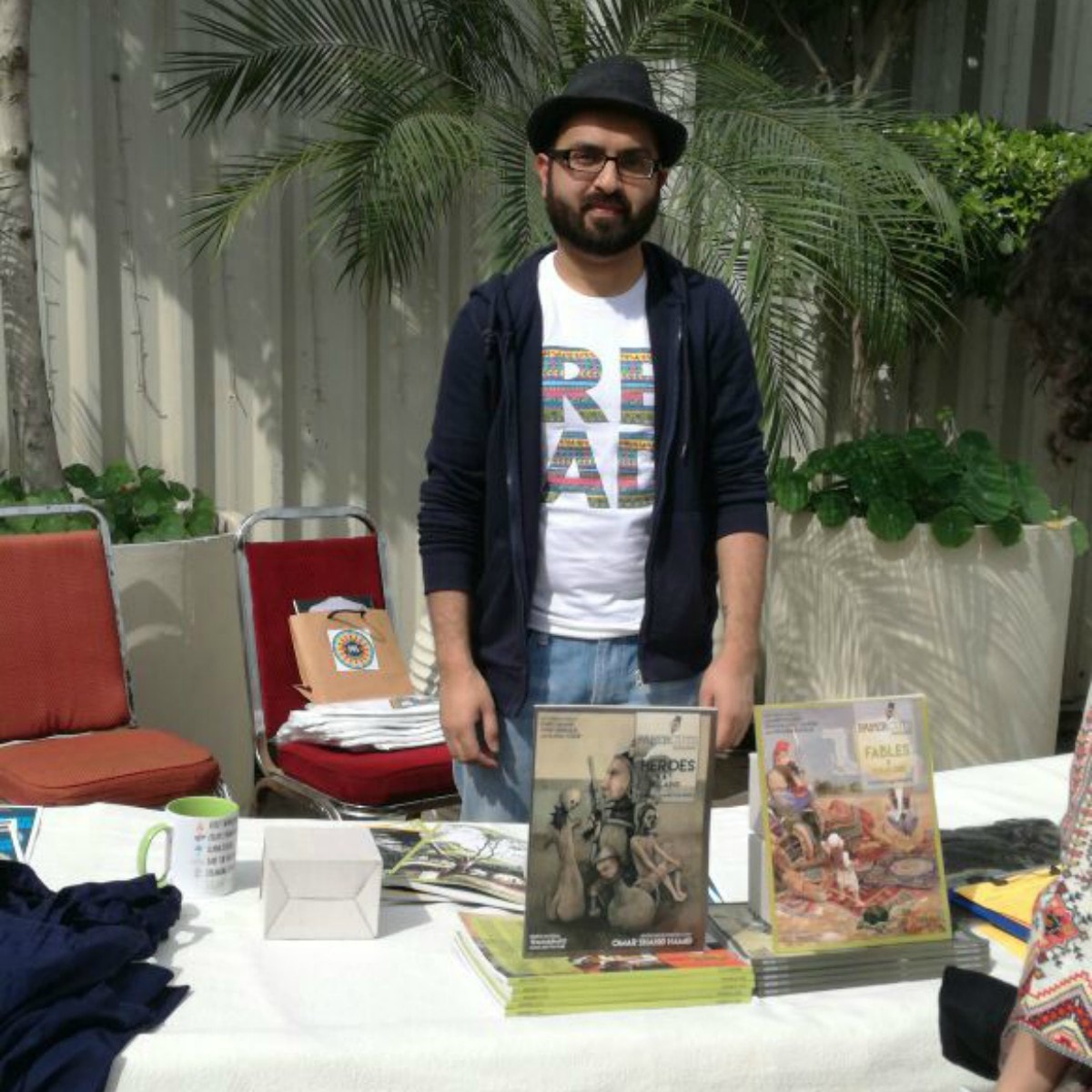
And we also ran into Nuscie Jamil, one of the organisers of LLF!
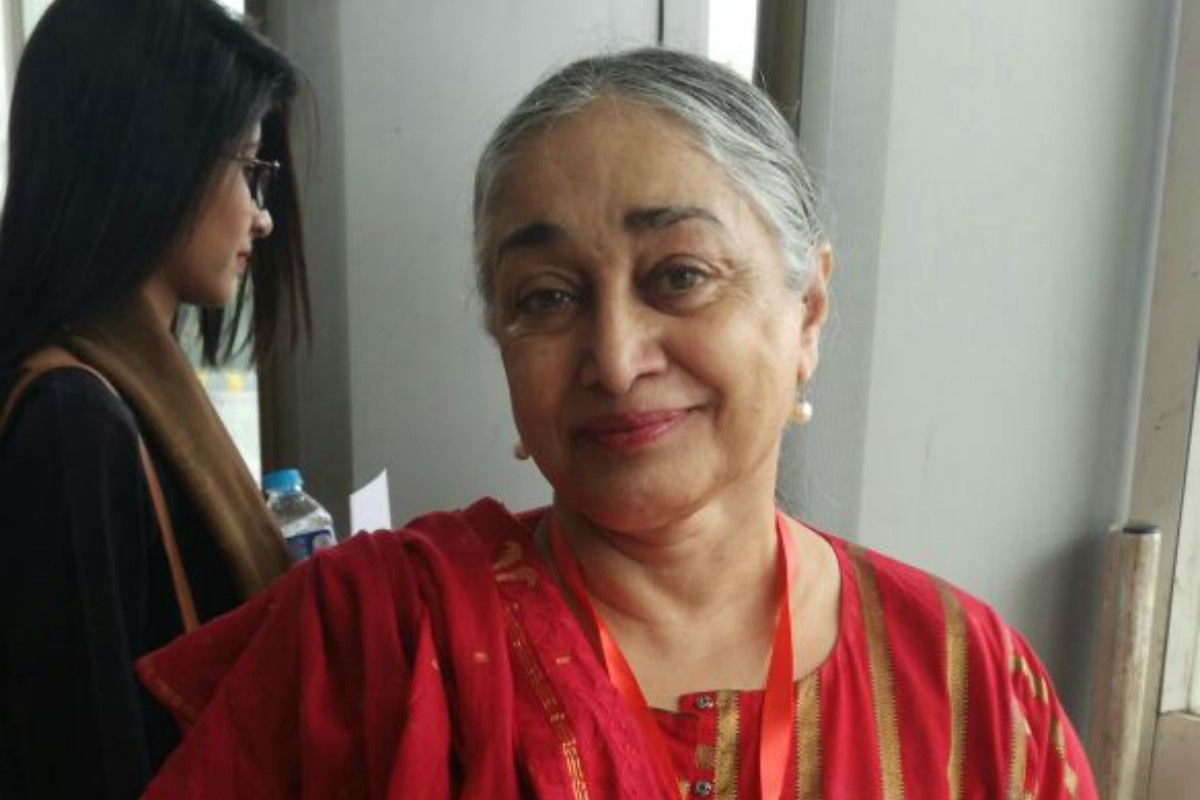
10:00: Michael Palin is met with fans and talks satire
Says Palin, "Good satire finds its way through closed doors"
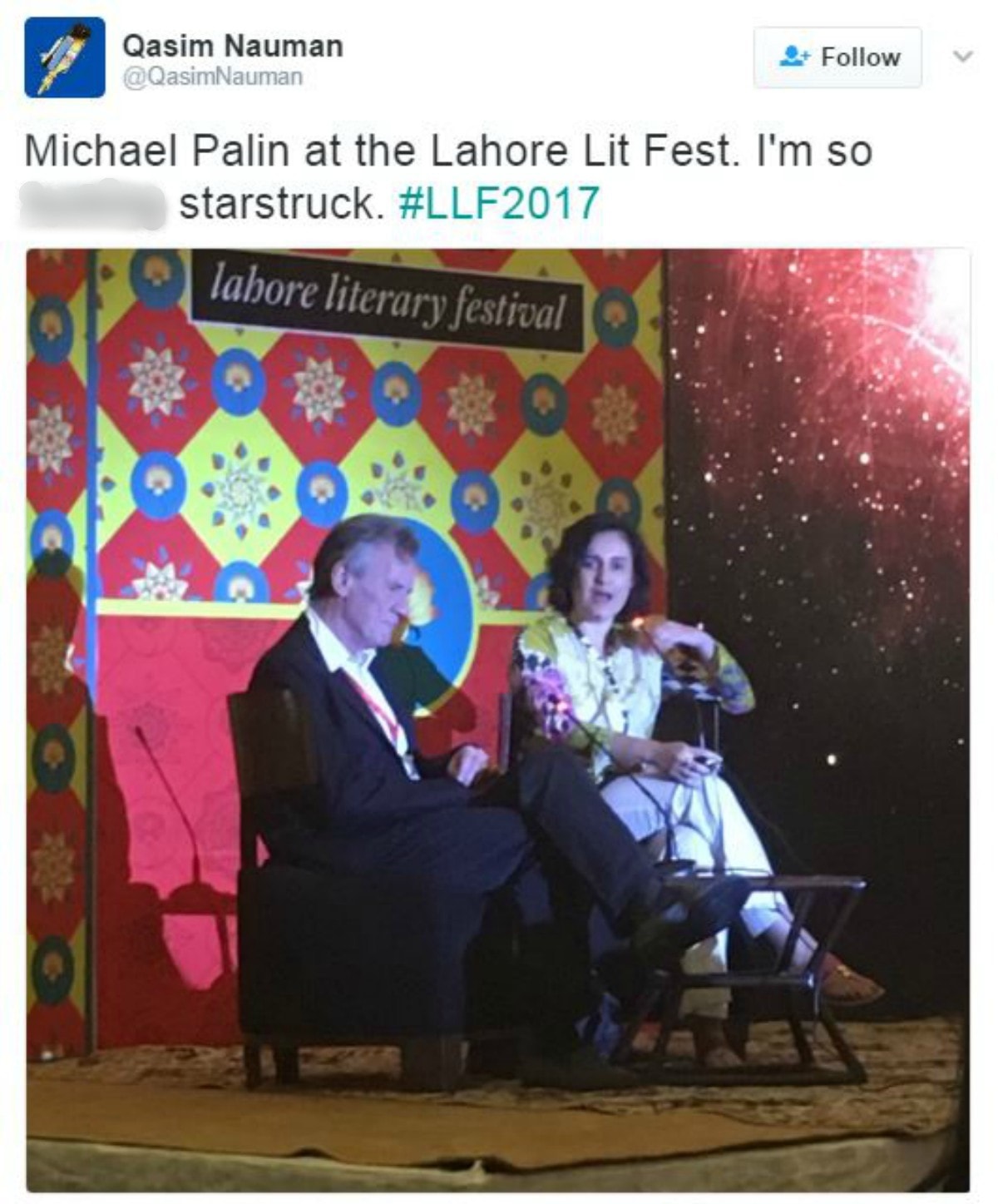
On Trump and his reaction to comedy and satire, Palin says, "As soon as you say it's not funny, it's funny."
He points out, "I have to say satire has not suffered from Trump coming to office"